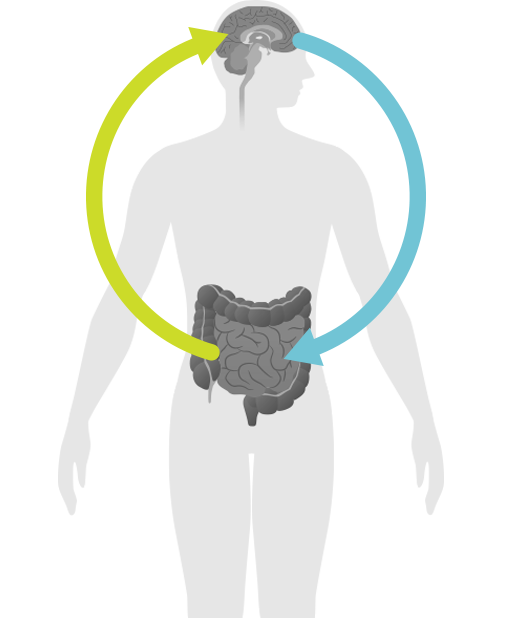What would happen if you poured Coca-Cola into your car’s gas tank and then tried to drive it? Chances are you wouldn’t make it very far. Just like the rest of our body, our brain is powered by the nutrients that we give it. If we fail to put nourishing food into our bodies (or worse – fill them with toxic substances), doesn’t it follow logically that we’ll encounter some serious malfunctioning?
Mental health begins in the gut (your digestive system), because the gut is responsible to intake, process, and deliver the nutrients needed to keep your brain healthy.

How Does the Gut Impact the Brain?
Our gut is home to trillions of tiny organisms called microbes that form a symbiotic relationship with us. Most of them live in our large intestine and feast off of the food that passes through. After “eating,” these microbes communicate directly with enteric nervous system (the network of nerves surrounding your gut) to deliver nutrients or alert your body to potential threats.
Your gut is highly intelligent and is sometimes called your second brain because it can conduct business apart from your central nervous system and communicate with other parts of the body through the Vagus nerve.
The Vagus nerve is a large nerve that runs as a “superhighway” between the gut and the brain (it also branches out to communicate with major organs and bodily systems). Surprisingly, the brain isn’t the only one sending signals to the gut via the Vagus nerve. It’s a two-way street.
For example, have you ever had “butterflies” in your stomach before a presentation or a date? The thoughts that your brain processes about your circumstances send signals to your gut, creating sensations that physically manifest what is going on in your head. And vice-versa: if your gut is experiencing a threat or attack, your brain will feel clouded and your mood irritable.
Healthy Gut = Healthy Mind
John Cryan and Dr. Ted Dinan, leading researchers in the gut-brain connection, state that tests they routinely run demonstrate that “the microbiota of the patients with depression were less diverse than the [non-depressed] controls.” This means that people with a lot of healthy microbes in their gut enjoy better mental health!
Poor gut health results in brain fog, fatigue, anxiety, lethargy, and irritability: ALL symptoms of depression. Studies even show that autism can be linked to problems in the gut.
By increasing our gut health, we can reduce or eliminate depression. And, in certain cases, depression is a side effect of poor gut health, instead of a stand-alone disease.
How do I Maintain a Healthy Gut?
Increasing microbe diversity in the gut is an excellent way to maintain a healthy gut. Sadly, most American diets and lifestyles are not very gut-friendly. Our overuse of antibiotics is a cultural blind spot, creating a massive population of people without a thriving intestinal flora. Antibiotics wipe out good bacteria along with the bad, which in the long run can make you more susceptible to illness! It’s like throwing the baby out with the bathwater: for the threat of a few dangerous microorganisms, we have compromised our intake of microbes in general! Of course, in moderation, antibiotics can be a life-saving and medically sound decision. But they are often over-prescribed while alternative options for healing remain underutilized.
Here are three main ways to improve your gut health:
Eat lots of prebiotics. Prebiotics are fibrous foods that nourish your microbes. Examples include:
- onions
- apples
- bananas
- oats
- and more.
Eat lots of probiotics. Probiotics are live cultures of microbes that strengthen the diversity of your microbiota. Here are some examples of probiotics that you can incorporate into your diet:
- Low-sugar yogurt made from quality milk
- Keifer
- Fermented vegetables
- Kombucha
Avoid taking antibiotics. Try alternative remedies to beat an infection before turning to an antibiotic, which wipes out good microbes along with the bad. If and when you do take an antibiotic, work hard through your diet to restore your gut health.
Life Hack:
A non-foodie way of improving your gut health is to practice yoga and deep breathing exercises. Conscious breathing stimulates your Vagus Nerve, the superhighway between the gut and the brain. You can learn more about the Vagus nerve here.






